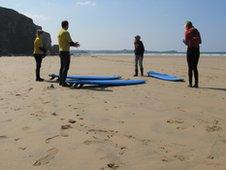Surfers on jobs, money and the economy
- Published
Spluttering, feeble and fragile. Three words to describe the state of the British economy at the moment.
New figures show we produced 0.2% more 'stuff' (goods and services) in the first three months of 2010. So the economy is still growing and less likely to fall back into recession than some feared.
But 0.2% is still very weak. And that's not good news for anyone running a business, looking for a job or hoping for a decent pay rise this year.
Of course a lot depends on where you live: parts of the UK are bouncing back from the recession much more quickly than others.
"Sometimes you worry for the future when you look in the diary and realise it's not full," said Ashleigh, 23, who runs her own surfing school in Newquay after taking over the business a couple of years ago.
"Looking around, shops have closed and surf schools are not operating as much. A couple of the beaches are pretty much ghost towns."

Some Cornwall surf schools and shops have been hit by the weak economy
The British economy is clearly not out of the woods yet. The latest figures show unemployment is still rising with 2.5 million out of work, the highest number in 16 years.
More than 8,000 firms have gone bust since the start of the recession including well known high street names like Woolworths and MFI. The price of petrol, clothing and food has been rising recently, putting even more pressure on household budgets.
"People will always have money but they are more careful about how they spent it," said Ashleigh. "Customers who can't afford to visit us in the summer and on bank holidays are coming down earlier and later when prices are a bit cheaper."
To get people spending again interest rates have been kept at a record low of 0.5% for well over a year now. That helps out businesses and home owners on the right kind of mortgage deals.
Tourist boost
The pound has also been falling sharply against the euro and other currencies making a short break abroad much more expensive than a couple of years ago.
That benefits regions like Cornwall that heavily depend on the tourist industry.
On one hand more Brits tend to stay at home and go on holiday here; on the other more foreign tourists fly in to Newquay, Exeter, and other airports to take advantage of cheap deals.
"We've noticed our French tourists and our German tourists really on the increase here," said Ashleigh. "It does feel that things are starting to look up. Our bookings are higher than last year so I'm optimistic about a good year here at the moment."
As for the future of the economy as a whole, much may depend on government spending.
Politicians have been borrowing heavily over the last couple of years to try and get us through the recession. The national debt has now hit its highest level since the end of the Second World War.
All the major political parties agree they will have start paying that cash back over the next couple of years.
Some people worry that a combination of tax rises and spending cuts will put a further brake on the economic recovery.
The message then if you are running your own business or hoping for a hefty pay rise is we are probably over the worst, but there is a long way to go until Britain starts booming again.